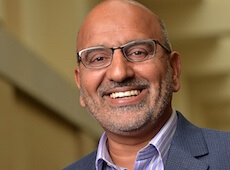Professor of Islamic Studies

I was drawn to Notre Dame because of the ambitious possibilities here to change the conversation about religion in the world today. Few academic institutions facilitate an effortless dialogue between theology and politics, religion and society, as well as Notre Dame does.
As a scholar of religion who also studies Islam, I am interested in how faith practices mix with theology, values, and ethics, and I examine how these influences become manifest in people’s lives. The University’s Keough School of Global Affairs is deeply invested in ensuring that religion factors in a constructive manner in global discussions of human development, peace, international and domestic politics, ethics, and economics.
One way we are pursuing these inquiries is through the exciting research projects that make up the Contending Modernities program, which I co-direct with two of my Keough School colleagues and is housed in the Kroc Institute for International Peace Studies. Plans are also afoot for an ambitious program dedicated to the study of the globalization of religion that will take lived religious practices and their normative claims around the world seriously. Doing so will allow us to consider how these practices and thoughts alter and advance our understanding of who we are and where we are heading, if we care to know.
Such questions invariably bring me back to Abu Hamid al-Ghazali (d. 1111), a Persian who wrote in Arabic and was read by St. Thomas Aquinas. Al-Ghazali is central to my work in the Department of History, where I am fortunate to have a joint appointment, and years of studying him have never dulled the impact of his observation that: “A rational foe is better than an ignorant friend.”
It was these words that taught me the value of the life of the mind, of finding that common ground on which all people of good will can stand.